3 min read
Honchō Scoops Up Two UK Search Awards!
It’s official, we've added not one, but two shiny trophies to our awards cabinet! We’re over the moon to share that we’ve triumphed at the UK Search...
As we enter a truly digital age, image AI technology becomes a huge player in today’s digital industry. With the likes of Google Lens, Pinterest and others having the capability to intelligently read images, the technology is getting closer to becoming something used in everyday lives.
Image AI technology is starting to reach levels of intelligence that have the potential to revolutionize the marketing industry in the very near future. Can this technology change the way we do SEO?
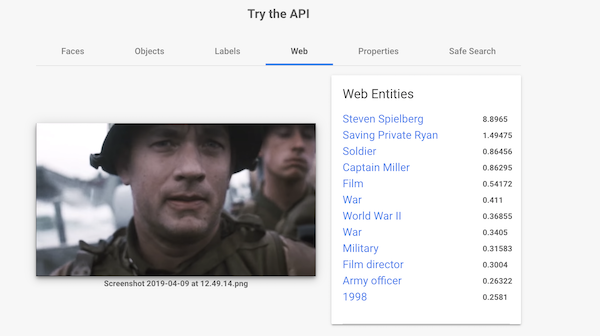 <class="aligncenter>
<class="aligncenter> Google Vision AI is an impressive tool that allows you to upload an image and feeds back what the image is about. I uploaded a screenshot I took from a scene in a film. This means this is a fresh image that hasn’t been taken from anywhere on the web.
Despite that, it still is able to fully understand what the image is of. It understands that it is a scene from Saving Private Ryan, it is a specific character (Captain Miller) and is a World War 2 film. It then can fetch back other sources where images match the exact same visual appearance of the screenshot. Despite the actual image file being unique.
What is more impressive is when uploading an image of the interior of a car. Looking at this image, it is extremely difficult to gauge anything from it. I wouldn’t have known what car that was. Google Vision AI was able to decipher what this image was about. It fetched back that it was from a Ford car.
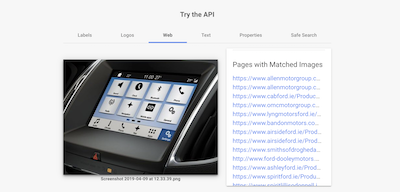 <class="aligncenter>
<class="aligncenter> 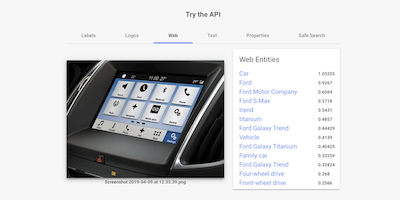 <class="aligncenter>
<class="aligncenter>
How it did this was from looking at sources where the same image visually was listed on and used that context to understand that it is a Ford car. Again, despite it being a unique image file, it understood that the actual image content is the same as what has been used online for Ford websites.
https://cloud.google.com/vision
Firstly I want to breakdown the two purposes for Alt text.
Best practice for Alt text is to describe what the image is about, not what the image is for.
So for example, if there is an image used for an article titled “best backpacks for 2019”, and the image is of someone walking in the rain with a backpack. The Alt text should be as descriptive as possible. Ideally something like this “man walking in the rain with a blue under armour backpack”. Not “best backpacks of 2019”
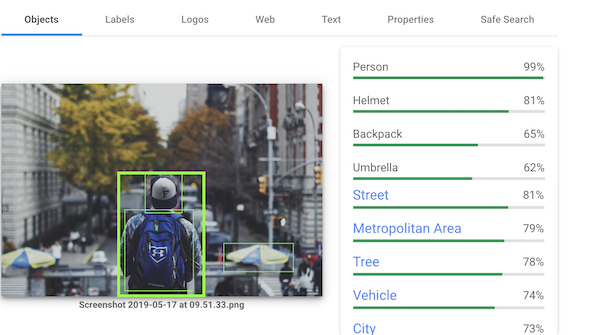 <class="aligncenter>
<class="aligncenter>
However, if Google Vision AI can already describe an image, Google has technology that already understands the context of an image. So what benefit does Alt text serve in terms of feeding Google info about your image? Alt text was best practice years ago when technology like this didn’t exist.
With the news earlier this year that Google now auto transcripts audio, it got me thinking about the possibility of the same thing happening to image Alt text.
In terms of it still serving a purpose to visually impaired people, if Vision AI already has all of the context and categorisation of an image, it has the data available to auto transcript. If audio has been given that treatment, it will not surprise me when images follow suit.
What’s in it for Google? If Google can auto-transcript it, there will no longer be images with no Alt text that serve no purpose for visually impaired people. It is a win-win situation. Effectively this makes images more accessible to visually impaired people without reliance on webmasters to implement Alt text.
Will Crichlow from Distilled believes that there is no evidence to suggest that Alt text benefits SEO and should only be used for accessibility.
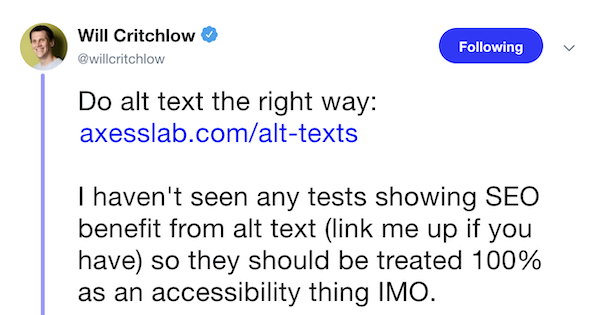 <class="aligncenter>
<class="aligncenter> As of now, Alt text is still a thing and is still important to allow people with disabilities to access it. This would be best practice right now. In a few years from now though? I’m not too sure.
If Google doesn’t see Alt text as a ranking factor, does that not suggest that they don’t need webmaster’s help on understanding the context of an image? Does it not suggest that it could be something “they’ve not been using for years” a bit like the pagination tags? I really believe AI will be able to automatically describe an image in the future.
Only time will tell, but the evolution of the way Google uses images is something everyone should be keeping a close eye on.
Not just on the topic of Alt text but on image technology in general. With the likes of Google Lens which at times can be fantastic, Pinterest, and others, AI is certainly becoming extremely intelligent at reading images. I truly believe that image AI technology will not only change search but the e-commerce industry as a whole in the near future.
For any more information on Google, or digital marketing services, get in touch.
</class="aligncenter></class="aligncenter></class="aligncenter></class="aligncenter></class="aligncenter>
3 min read
It’s official, we've added not one, but two shiny trophies to our awards cabinet! We’re over the moon to share that we’ve triumphed at the UK Search...

5 min read
Understand ecommerce attribution models which attribution models can maximise your marketing efforts and ROI.

3 min read
Explore how social commerce is changing the way we shop online, blending social interactions with digital commerce for a seamless buying experience.